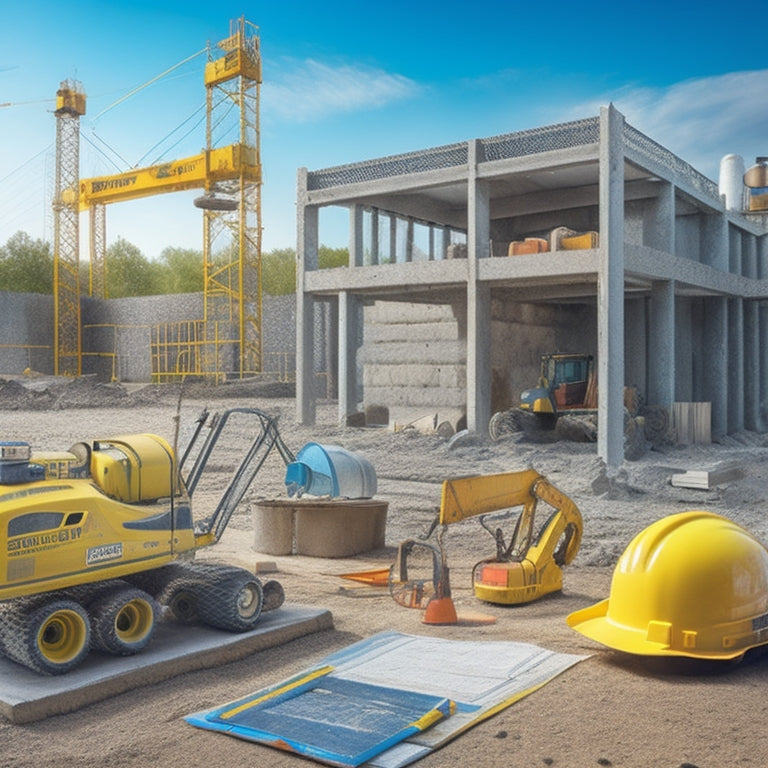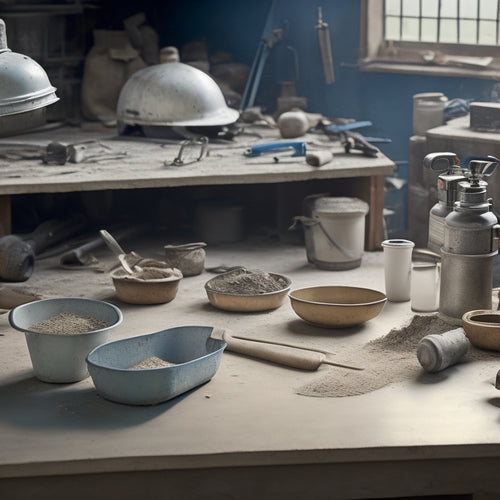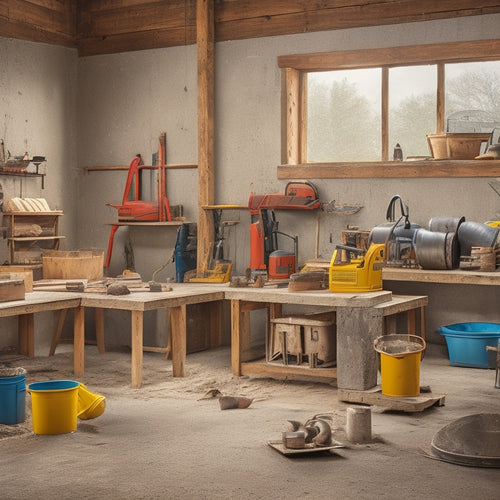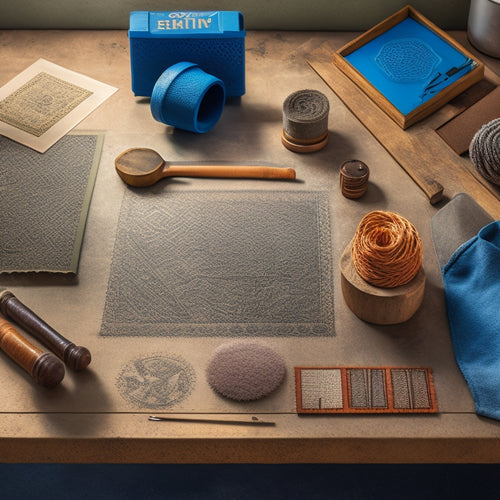
3 Must-Have Tools for Building a Concrete House
Share
When building a concrete house, you'll need to equip yourself with the right tools to achieve a structurally sound and visually appealing structure. You can't go wrong with a trusty trowel for spreading and shaping mortar, a mixing bucket and trowel for achieving perfect mortar consistency, and a level and straightedge to guarantee walls are plumb and joints are clean. These three must-haves will set you up for success, and as you progress, you'll discover the importance of additional tools that can take your concrete house to the next level of quality and aesthetic appeal.
Key Takeaways
• A trowel is a must-have tool for spreading and shaping mortar with precision in concrete house construction.
• A mixing bucket and trowel are necessary for achieving the perfect mortar consistency and workability.
• A level and straightedge are essential for ensuring walls are plumb and joints are clean and even.
• A wheelbarrow or mixing tub is necessary for transporting and mixing large quantities of mortar efficiently.
• High-quality tools are a worthwhile investment for accuracy, ease of use, and durability in concrete house construction.
Essential Masonry Tools for Beginners
Before you begin building your concrete house, you'll need to assemble a set of essential masonry tools that will help you achieve professional-looking results. As a beginner, it's vital to invest in high-quality tools that will make your job easier and guarantee accuracy.
A sturdy trowel is a must-have for any masonry project. Mastering trowel techniques will enable you to spread and shape mortar with precision, resulting in smooth, even surfaces.
Speaking of mortar, you'll need a reliable mixing bucket and trowel to achieve the perfect consistency. A mixing stick or drill with a mixing paddle will make quick work of mortar mixing.
Don't forget a level, straightedge, and jointer to guarantee your walls are plumb and your joints are clean.
A wheelbarrow or mixing tub will come in handy for transporting and mixing large quantities of mortar.
With these essential tools in your arsenal, you'll be well on your way to building a beautiful, structurally sound concrete house that will make you proud to call it your own.
Advanced Concrete Finishing Equipment
With your masonry tools in hand, you're now ready to take your concrete house to the next level by incorporating advanced finishing equipment that will elevate its aesthetic appeal and durability.
This is where the professionals separate themselves from the DIY enthusiasts, and you're about to join their ranks.
To achieve a showroom finish, you'll need the following advanced concrete finishing equipment:
-
Polishing machines: These machines use progressively finer abrasives to remove imperfections and produce a high-gloss finish.
-
Concrete trowels: Designed for precision and control, these trowels allow for even spreading and finishing of concrete.
-
Power floats: These tools use rotating blades to flatten and smooth out the concrete surface, preparing it for further finishing.
- Edgers: Used to create clean, defined edges and borders, edgers are essential for a professional-looking finish.
Specialized Block Laying Instruments
You'll need to precision-craft each block's placement to verify a structurally sound and visually appealing concrete house, which is where specialized block laying instruments come into play. These tools enable you to achieve precise block alignment techniques, guaranteeing a strong and durable structure.
Here are some essential specialized block laying instruments you'll need:
| Tool | Function |
|---|---|
| Spirit Level | Verifies blocks are perfectly level and plumb |
| Laser Level | Projects a precise level line for accurate block placement |
| Block Alignment Clamps | Holds blocks in place while you lay adjacent blocks |
| Precision Measuring Tools | Measures and marks block positions with accuracy |
Frequently Asked Questions
What Safety Precautions Should I Take When Working With Concrete?
When working with concrete, you'll want to prioritize concrete safety above all else.
To avoid accidents, you must wear protective gear, including gloves, safety glasses, and a dust mask. You should also cover your skin and hair to prevent irritation.
Make certain the work area is well-ventilated, and avoid mixing concrete in confined spaces.
Can I Use a Concrete House for Building in Earthquake-Prone Areas?
When building in earthquake-prone areas, you'll want to guarantee your concrete house is designed with earthquake resistance in mind.
This starts with a robust foundation design that can absorb seismic forces.
You'll need to consult with a structural engineer to develop a custom design that meets local building codes and regulations.
How Do I Ensure Proper Drainage Around My Concrete House?
You're building your dream concrete home, and now it's time to guarantee it stays dry and cozy!
To avoid water woes, you'll want to focus on proper drainage solutions.
Start by evaluating your landscape grading, making sure the ground slopes away from your home. This will prevent water from pooling around the foundation.
Next, install a French drain system or a swale to direct water flow.
With these measures in place, you can rest easy knowing your home is protected from moisture damage.
Are Concrete Houses More Expensive Than Traditional Wood-Framed Houses?
You're likely wondering if concrete houses come with a higher price tag than traditional wood-framed ones.
The short answer is yes, they often do.
However, it's crucial to evaluate the cost comparison in the long run.
While the initial investment might be higher, concrete houses offer long-term savings through reduced maintenance, increased energy efficiency, and a longer lifespan.
Can I DIY a Concrete House or Do I Need Professional Help?
You're wondering if you can tackle a concrete house project on your own or need expert guidance.
While DIY techniques can be applied to certain aspects, it's essential to acknowledge when professional assistance is necessary.
Concrete house construction requires specialized skills and equipment, so unless you have extensive experience, it's recommended to seek help from a seasoned contractor to guarantee a structurally sound and safe living space.
Conclusion
As you wrap up your concrete house project, remember that having the right tools can make all the difference.
With the essential masonry tools, advanced concrete finishing equipment, and specialized block laying instruments, you'll be well on your way to a sturdy and durable structure.
Did you know that, according to the National Association of Home Builders, concrete homes can last up to 100 years or more with proper maintenance?
With these must-have tools, you'll be building a legacy that will stand the test of time.
Related Posts
-

What Tools Do You Need for Concrete Success
For concrete success, you'll need a range of essential power tools, including rotary hammers, angle grinders, concret...
-

What Tools to Rent for a Concrete Home Reno
When tackling a concrete home renovation, you'll need to rent a variety of specialized tools to get the job done. For...
-

5 Best Tools for Stamping Concrete Walls
When it comes to stamping concrete walls, you'll need a range of specialized tools to achieve the desired texture and...


